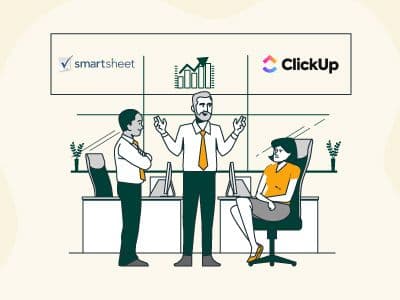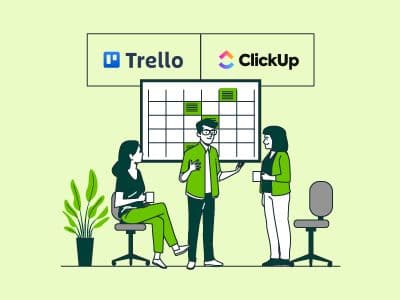Select up to 2 products
Compare Features
Feature List |  TimeCamp | monday.com Software | BigTime Software | BQE CORE | Smartsheet |
|---|---|---|---|---|---|
Time Tracking | |||||
Task Management | |||||
Reporting | |||||
Budget Management | |||||
Resource Allocation | |||||
Employee Management | |||||
Mobile App | |||||
Project Templates | |||||
Project Scheduling | |||||
Dashboard |
Make decisions with real reviews from real users
Top 9 TimeCamp Alternatives
TimeCamp is a well-known time tracking solution that helps businesses across healthcare, manufacturing, and e-commerce sectors to monitor projects’ time efficiency for better profitability. Given the value it adds for businesses in managing attendance, timesheets, and team performance, it may not be the right fit for every business. Drawbacks such as fewer customizations for task names, a lack of effective customer service policies, and limited reporting abilities through the mobile app may lead users to explore alternative options.
Here, we will review the top 9 TimeCamp alternatives to help you make an informed decision for your organization. For each tool, we will be covering offerings, pros, cons, and pricing details.
Let’s begin!
TL;DR: What’s the best alternative to TimeCamp? Clockify comes out on top with automatic time tracking, a shared team calendar, and kiosk mode for on-site teams, making it a complete yet straightforward solution for tracking and billing.
1. Clockify
Best For: Freelancers, agencies, and startups
Overall Rating: 4.2
Free Trial: Available for paid plans
Clockify is a popular free time-tracking app which is utilized by more than 5 million users globally. The platform is adaptable for both remote and on-site teams because it provides timers, timesheets, calendars, and a kiosk mode. Compared to TimeCamp’s basic kiosk features, Clockify offers branded kiosks by placing company logos on the kiosks.
Moreover, Clockify goes a step further from TimeCamp by offering advanced project management capabilities such as project progress monitoring. Also, it provides both manual and automatic employee tracking functionalities, which is why we recommend Clockify because of its simplicity, scalability, and free availability.
What Are The Pros And Cons Of Clockify?
Pros | Cons |
Detailed reporting makes time usage analysis easy Easy for new teams to adapt to the software Central dashboard shows total hours per task clearly | Occasional sync issues occur between multiple devices Date range filters sometimes pull inaccurate time entries |
How Much Does Clockify Cost?
Clockify offers multiple subscription tiers with a 7-day free trial:
- Free: $0 (unlimited number of users)
- Basic: $4.99/seat/month
- Standard: $6.99/seat/month
- Pro: $9.99/seat/month
- Enterprise: $14.99/seat/month
Additionally, the platform also offers a productivity suite cake.com bundle for $15.99/seat/month.
Disclaimer: The pricing is subject to change.
2. Hubstaff
Best For: Software development, construction, and e-commerce
Overall Rating: 3.9
Free Trial: Available
Hubstaff is a comprehensive workforce management and time tracking tool. Currently, over 112,000 companies worldwide use it to track their employees’ work contributions. While TimeCamp’s core focus is on delivering time tracking features, HubStaff helps companies in administrative tasks such as running payrolls.
Also, we suggest Hubstaff in place of TimeCamp for advanced scheduling tools, where businesses can mitigate labor costs, get alerts of abandoned shifts, and predict shifts. Its privacy-first design provides transparency without compromising trust.
What Are The Pros And Cons Of Hubstaff?
Pros | Cons |
Accurate time tracking across tasks and technical projects Helps monitor productivity through time tracking and screenshots Detailed reports deliver valuable productivity insights | Unauthorized payment attempts create major trust concerns Timesheets are inconsistent and clunky for payroll use |
How Much Does Hubstaff Cost?
Hubstaff offers several plans on a per-user, per-month basis and comes with a 14-day free trial:
- Starter: $7/seat/month (2 seats minimum)
- Grow: $9/seat/month ((2 seats minimum)
- Team: $12/seat/month (2 seats minimum)
- Enterprise: $25/seat/month (billed annually)
Disclaimer: The pricing is subject to change.
3. Harvest
Best For: Creative services, engineering, and architecture
Overall Rating: 5
Free Trial: Available
Harvest is a comprehensive time tracking and invoicing platform. Over 70,000 companies around the world use it to enable their teams to log hours. Compared to TimeCamp’s limited integrations for payments, Harvest offers direct connectivity with leading tools such as Stripe and Paypal. This simplifies turning tracked hours into invoices for quick payments.
Overall, we recommend Harvest for teams that are looking for an easy way to track time, bill clients, and understand project profits.
What Are The Pros And Cons Of Harvest?
Pros | Cons |
Flexible time tracking with ability to edit entries Automated invoicing and payment tracking with mobile app Customizable projects and tasks with fee schedules | Requires a stable internet connection, no offline functionality Limited manual time entry options |
How Much Does Harvest Cost?
The vendor offers the following pricing plans with a 30-day free trial:
- Free: $0 forever
- Pro: $13.75/seat/month
- Premium: $17.50/seat/month
Disclaimer: The pricing is subject to change.
4. Toggl Track
Best For: Designers, Accountants, and Lawyers
Overall Rating: N/A
Free Trial: Available
Toggl Track is one of the leading time tracker tools that serves a large user base. It provides integrations with over 100 software applications, such as Jira, Asana, and others, to create a connected workflow experience for businesses. While TimeCamp offers basic reporting tools, Toggl Track shines with its advanced reporting capabilities that help in tracking profitability at every level and provide workload views to evaluate the team’s overall efficiency.
Also, the anti-surveillance policy of Toggl Track, which is absent in TimeCamp, helps managers to capture data in a way that relieves employees from the stress of micromanagement. Hence, we have placed it on our TimeCamp alternatives list.
What Are The Pros And Cons Of Toggl Track?
Pros | Cons |
Helps in accurately tracking project time for correct payments Aids in creating connected workflows through diverse integration range Provides color coding to highlight areas to work | Limited reporting on macOS Some users have faced challenges with auto-track |
How Much Does Toggl Track Cost?
The vendor provides subscription-based pricing model with a 30-day free trial for paid plans. The plans are:
- Free: $0 (for up to 5 users)
- Starter: $10/user/month
- Premium: $20/user/month
- Enterprise: custom pricing
Disclaimer: The pricing is subject to change.
5. Time Doctor
Best For: BPO, Healthcare, and Contact Center
Overall Rating: 4.6
Free Trial: Available
Time Doctor is a popular time tracking and workforce analytics platform that helps managers in overseeing their team’s performance and working hour utilization. Currently, 10,000 plus companies use it to locate inefficiencies and burnout risks. As compared to TimeCamp’s focus only on time tracking, Time Doctor includes tools to set up workforce schedules and compare scheduled vs actual hours worked, making workforce management easier while providing security and compliance at an enterprise level.
Hence, we recommend Time Doctor as an alternative to TimeCamp for organizations that want clear insights into employee productivity, work efficiency, and functionalities that go beyond time tracking.
What Are The Pros And Cons Of Time Doctor?
Pros | Cons |
Helps improving processes by offering feedback on time management Allows placing widget anywhere on screen, enhancing convenience Captures screenshots, which increases transparency | May require too many clicks to find desired reports Some users have reported minor inefficiencies in the mobile app |
How Much Does Time Doctor Cost?
Time Doctors offers transparent pricing plans with a 14-day trial. The plans are:
- Basic: $8.00/user/month
- Standard: $14.00/user/month
- Premium: $20.00/user/month
- Enterprise: custom pricing
Disclaimer: The pricing is subject to change.
6. Timely
Best For: SaaS, Professional Services, and Consultancy
Overall Rating: N/A
Free Trial: Available
Timely is an automated time tracker driven by AI that reduces reliance on guesswork and manual logging. More than 20,000 users at organizations trust it because it provides accurate time data without disrupting workflows. Timely’s ‘Memory Tracker’ goes beyond the basic tools of TimeCamp, helping businesses to automate time tracking and keep a record of employee work activities throughout the day.
While TimeCamp covers basic privacy features, Timely excels due to its stronger privacy-first philosophy. It enables users to select what data can be shared publicly. Also, it integrates over 100 apps and provides two-way syncing with popular project management tools for enhanced efficiency.
For businesses looking for a simple and dependable TimeCamp alternative, we suggest Timely to increase overall output and profitability.
What Are The Pros And Cons Of Timely?
Pros | Cons |
Automates time tracking, reducing the need for manual entries Integrates with Google Contacts and Google Calendar, improving client experience Offers a complete solution for smaller businesses | Some users have run into minor issues with booking software Lacks advanced features for the healthcare industry |
How Much Does Timely Cost?
The vendor offers following pricing tiers with a 14-day free trial:
- Starter: $11/user/month (20 projects and max 5 users)
- Premium: $20/user/month (unlimited projects and max 50 users)
- Unlimited: $28/user/month (unlimited projects and users)
Disclaimer: The pricing is subject to change.
7. QuickBooks Time
Best For: Landscaping, construction, and freelance
Overall Rating: 4.2
Free Trial: Available
QuickBooks Time, part of Intuit, is a versatile time recording software used by thousands of organizations from all industries. As compared to TimeCamp, it encompasses facial recognition technology to maintain check-in accuracy and avoid buddy punching. Also, the reporting functionality helps users to generate robust wage reports, something TimeCamp lacks.
While TimeCamp supports third-party integrations, QuickBooks Time creates a more unified and intuitive experience for users by integrating over 800 leading business apps. This helps in simplifying business financials as well as helping managers gain valuable insights into team member productivity.
For organizations requiring a TimeCamp alternative that scales, is reliable and delivers exceptional reports, we recommend utilizing QuickBooks Time.
What Are The Pros And Cons Of QuickBooks Time?
Pros | Cons |
Improves decision-making by generating staff hours reports Enhances employee convenience by offering multiple clock-in options Helps staff to be mindful of missed punches through effective reminders | Limited features for expense tracking and financial management It may take time to set up a time kiosk |
How Much Does QuickBooks Time Cost?
It provides four pricing plans with a free trial of 30 days:
- Simple Start: $38/month (1 user)
- Essentials: $75/month (3 users)
- Plus: $115/month (5 users)
- Advanced: $275/month (25 users)
Disclaimer: The pricing is subject to change.
8. Connecteam
Best For: Cleaning, Retail, and Field Services
Overall Rating: 4.8
Free Trial: Available
Connecteam is an end-to-end platform designed to streamline day-to-day tasks for deskless teams. With over 60,000 companies using it, it combines multiple time tracking and task management capabilities into one solution. While TimeCamp covers essential time tracking features, Connecteam helps businesses in conducting employee quizzes to better understand employee learning and performance.
As compared to limited AI features in TimeCamp, Connecteam leverages AI to automate scheduling, creating forms, and translating team updates into each employee’s preferred languages.
We recommend Connecteam as an alternative to TimeCamp for organizations that wish to consolidate various apps into one simple-to-use solution that is designed for mobile-first frontline teams.
What Are The Pros And Cons Of Connecteam?
Pros | Cons |
Facilitates team’s internal communication Helps in monitoring the field workforce’s working hours Simplifies form submission through a digital platform | May not integrate with external CRM or accounting tools Does not offer built-in payroll processing |
How Much Does Connecteam Cost?
Connecteam offers an extensive range of pricing plans for each of its hubs: ‘Operations’, ‘Communications’, and ‘HR & Skills’. All these plans come with a free trial of 14 days. The plans are:
Operations
- Basic: $29/month plus $0.8/month/each additional user after 30 users
- Advanced: $49/month plus $2.5/month/each additional user after 30 users
- Expert: $99/month plus $4.2/month/each additional user after 30 users
- Enterprise: customized
Communications
- Basic: $29/month plus $0.5/month/each additional user after 30 users
- Advanced: $49/month plus $1.5/month/each additional user after 30 users
- Expert: $99/month plus $3/month/each additional user after 30 users
- Enterprise: customized
HR & Skills
- Basic: $29/month plus $0.5/month/each additional user after 30 users
- Advanced: $49/month plus $1.5/month/each additional user after 30 users
- Expert: $99/month plus $3/month/each additional user after 30 users
- Enterprise: customized
Disclaimer: The pricing is subject to change.
9. ClickTime
Best For: Biotech, Event Planning, and Real Estate
Overall Rating: 4.6
Free Trial: Available
ClickTime is a comprehensive time and resource management tool that helps teams stay productive and profitable. It offers 70 plus reports that help in monitoring staff work hours and overseeing real-time progress. ClickTime outshines TimeCamp by offering advanced compliance support for overtime hours, DCAA, and other regulations
ClickTime also offers capacity planning features, which TimeCamp lacks. This helps businesses in figuring out optimal staffing levels, manage workloads, and account for employees' leaves so workflow is not interrupted. Hence, we have considered ClickTime a valuable option in place of TimeCamp.
What Are The Pros And Cons Of ClickTime?
Pros | Cons |
Improves employee productivity by tracking working hours Offers vacation accruals which enables staff to check their balance Makes the timesheet creation faster | The website may be difficult to navigate May not automatically track compensation time |
How Much Does ClickTime Cost?
ClickTime offers transparent PEPM pricing model with a free trial of fourteen-days. The plans it provides are:
- Starter: $12/user/month (up to 25 users)
- Team: $15/user/month (up to 200 users)
- Premier: $27/user/month (up to 200 users)
- Enterprise: custom pricing
Disclaimer: The pricing is subject to change.
How We Chose Our TimeCamp Alternatives?
To select the best TimeCamp alternatives, we observed each solution for the following metrics:
Selecting The Best TimeCamp Alternative
Finding the right alternative for TimeCamp depends on your business’s requirements. These include team’s size, industry type, and long-term goals. Ultimately, the best choice is the one that balances ease of use, scalability, and resolves the specific challenges your team faces. By evaluating your needs against the strengths of these nine TimeCamp alternatives, you can confidently choose a solution that helps improve productivity and drives better results.
Ready to make the change? Contact us today to connect with an expert for further advice on the best time tracking software for your business!




